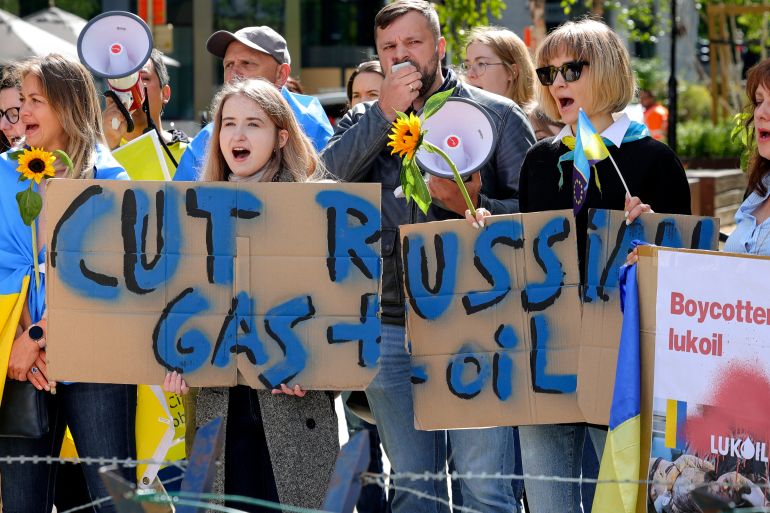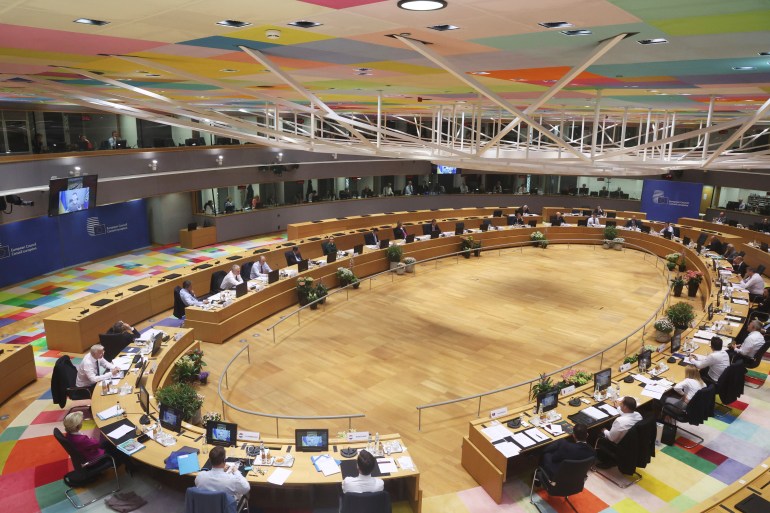EU leaders agree to Russian oil ban after compromise with Hungary
EU says deal will effectively cut 90 percent of oil imports by year-end cutting off key source of Moscow’s funding for Ukraine war.

European Union leaders have agreed in principle to cut 90 percent of oil imports from Russia by the end of this year, cutting off a vital source of funding for Moscow’s invasion of Ukraine, after reaching a compromise deal with Hungary.
The 27-nation organisation has spent weeks haggling over a complete ban on Russian oil but encountered stubborn resistance from Hungarian Prime Minister Viktor Orban who said an embargo would destroy his country’s economy.
Keep reading
list of 4 itemsFrench journalist killed during Russian bombardment in Ukraine
Russia suspends gas deliveries to Dutch trader GasTerra
Biden: US will not send Ukraine rockets that can reach Russia
At a meeting in Brussels on Monday, leaders hatched a compromise deal to exempt deliveries arriving in Europe by the Druzhba pipeline.
“Agreement to ban export of Russian oil to the EU. This immediately covers more than two thirds of oil imports from Russia, cutting a huge source of financing for its war machine,” European Council chief Charles Michel said in a tweet at the end of the first day of a two-day leaders’ summit.
“Maximum pressure on Russia to end the war,” Michel added.
The head of the EU’s executive, Ursula von der Leyen, said the move “will effectively cut around 90 percent of oil imports from Russia to the EU by the end of the year” when Germany and Poland have promised to end deliveries via pipeline.
Two-thirds of the Russian oil imported into the EU is delivered by tanker and one third by the Druzhba pipeline. The embargo would reach 90 percent after Poland and Germany, which are also connected to the pipeline, stop taking delivery of Russian oil by the end of the year.

The remaining 10 percent will be temporarily exempt from sanctions so that Hungary, Slovakia and the Czech Republic, which are all connected to the southern leg of the pipeline, continue to have access to fuel they cannot easily replace.
“Russia has chosen to continue its war in Ukraine. Tonight, as Europeans, united and in solidarity with the Ukrainian people, we are taking new decisive sanctions,” French President Emmanuel Macron tweeted.
The compromise means other measures can also take effect, including disconnecting Russia’s biggest bank Sberbank from the global SWIFT system, banning three state broadcasters, and blacklisting individuals blamed for war crimes.
Zelenskyy’s criticism of the EU
In a video address to the summit earlier, Ukrainian President Volodymyr Zelenskyy chastised EU leaders for being too soft on Moscow.
“Why are you dependent on Russia, on their pressure, and not vice-versa? Russia must be dependent on you. Why can Russia still earn almost a billion euros a day by selling energy?” Zelenskyy said.
The EU has rolled out five rounds of sanctions since Russia invaded Ukraine in February, demonstrating uncharacteristic speed and unity given the complexity of the measures.
But the haggling over an oil import ban exposed a struggle to widen sanctions as the economic risk for Europe grows because so many countries depend on Russia for their energy supplies.
Dutch Prime Minister Mark Rutte said as he left the Brussels talks that he had been surprised by the turn of events.
“At the beginning of the evening I wasn’t at all hopeful, but at 11pm or so, it was done,” he said, adding that outstanding technical details should not be difficult to resolve.
Still, Ramanan Krishnamoorti, a professor of petroleum engineering at the University of Houston in the United States, said the impact on Russia might not be as significant as thought, with countries such as India and China stepping in.
“They will be able to buy discounted Russian oil at even lower prices than they have been in the past few months,” he told Al Jazeera.
He also suggested the embargo could also have positive implications for Iran and Venezuela.
“They might be able to get to friendly terms with Europe and USA and start a way to normalise their ability to reintroduce their energy back into the world market,” he added.
The summit also brought political backing for a package of EU loans worth nine billion euros ($9.7 billion), with a small component of grants to cover part of the interest, for Ukraine to keep its government going and pay wages for about two months.
Leaders also backed the creation of an international fund to rebuild Ukraine after the war, with details to be decided later.